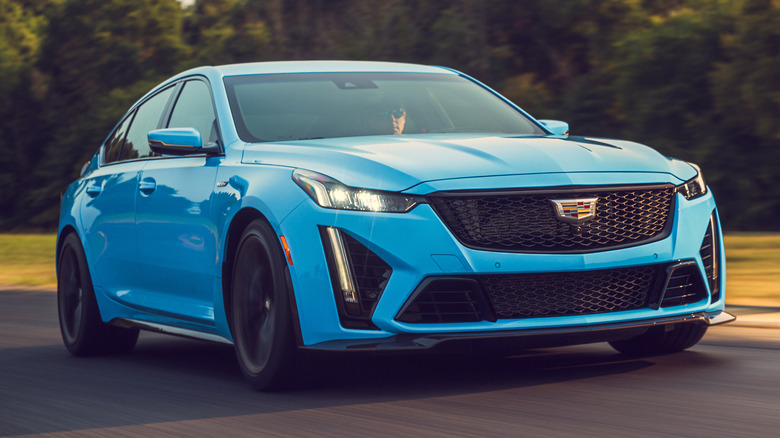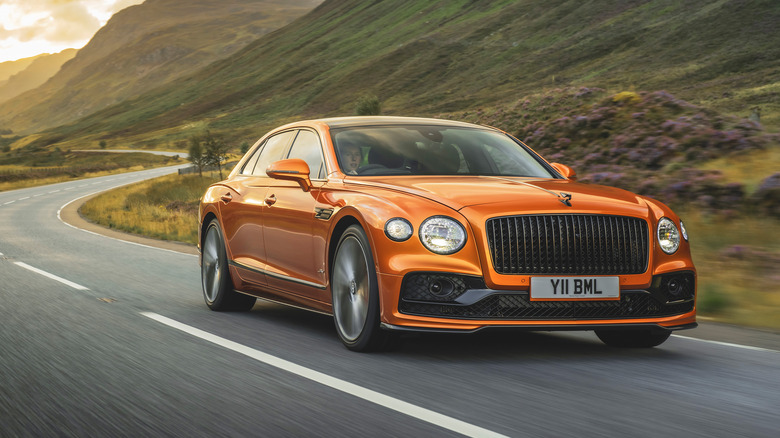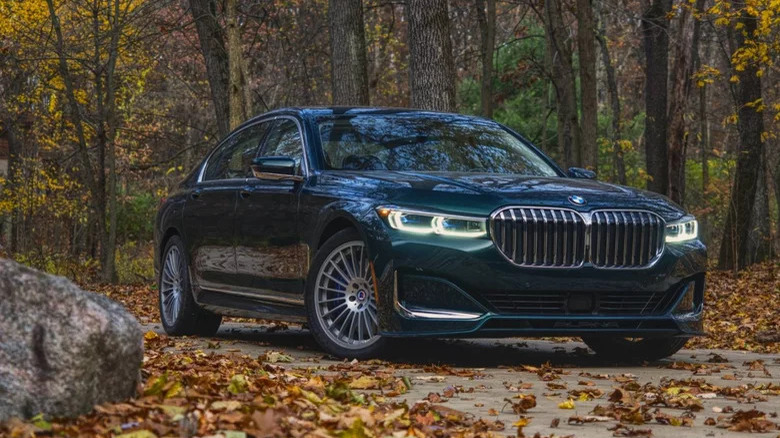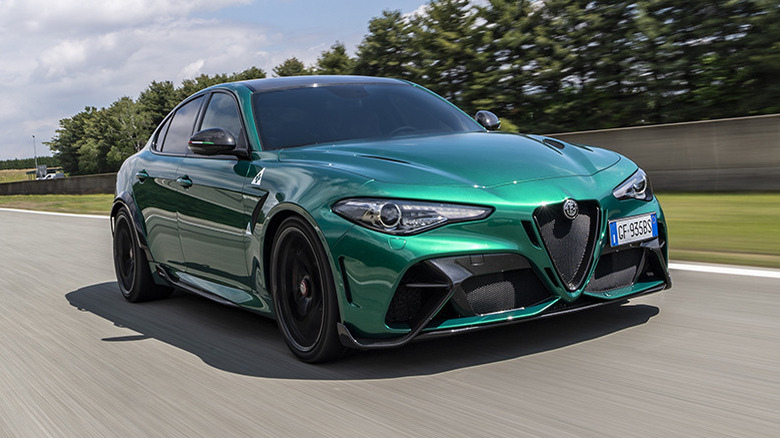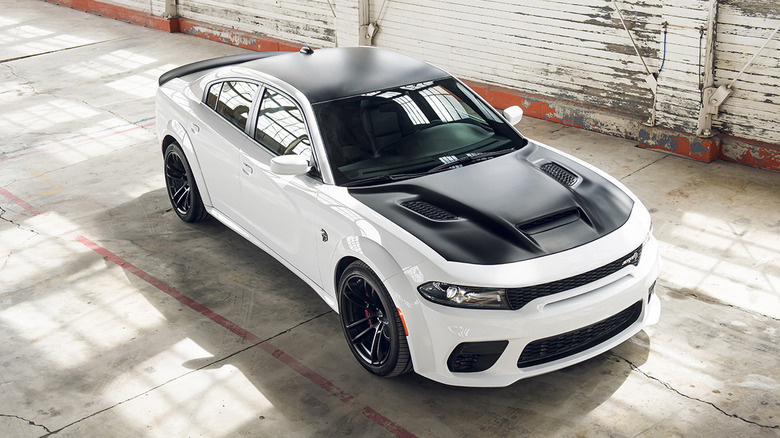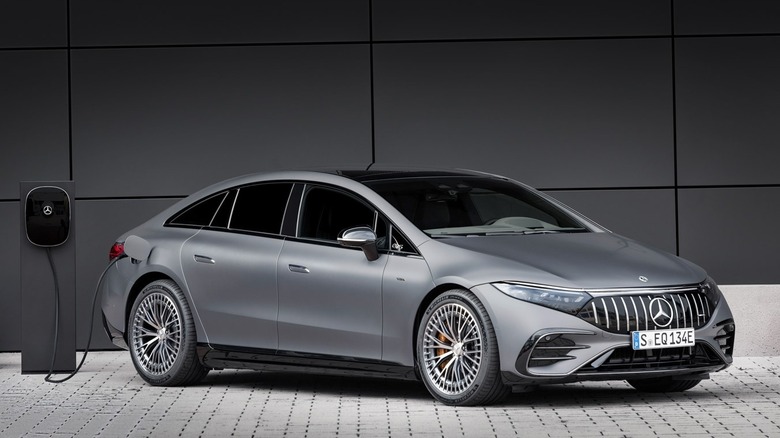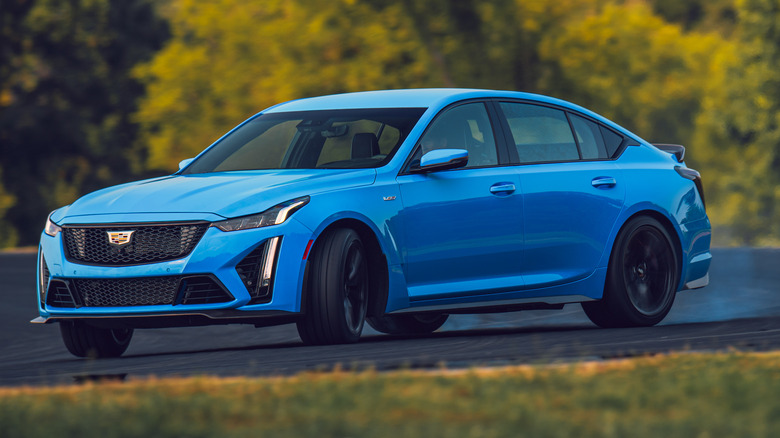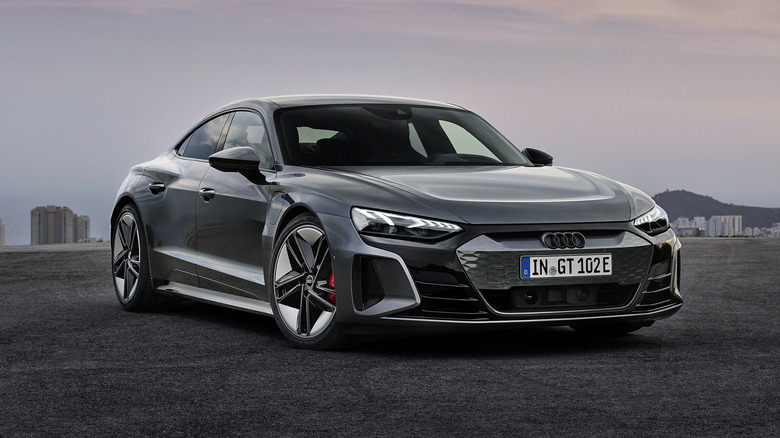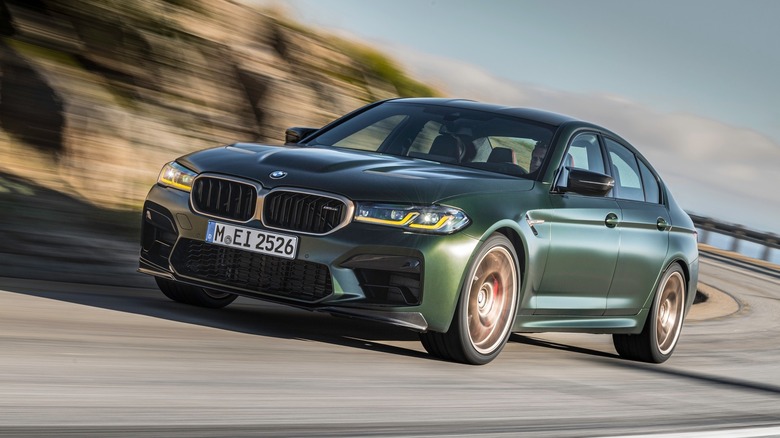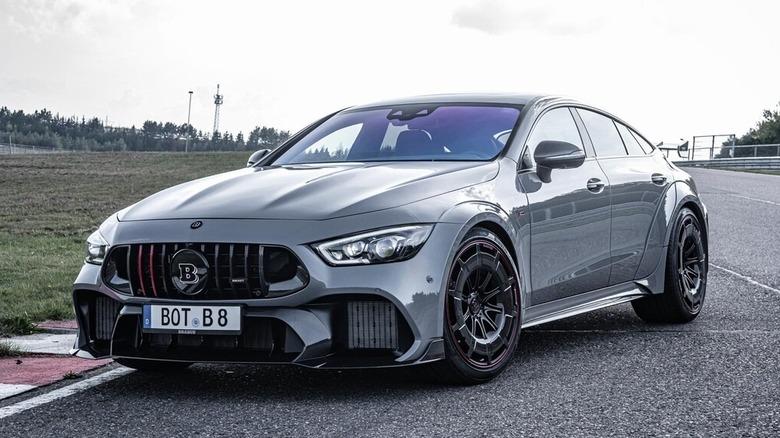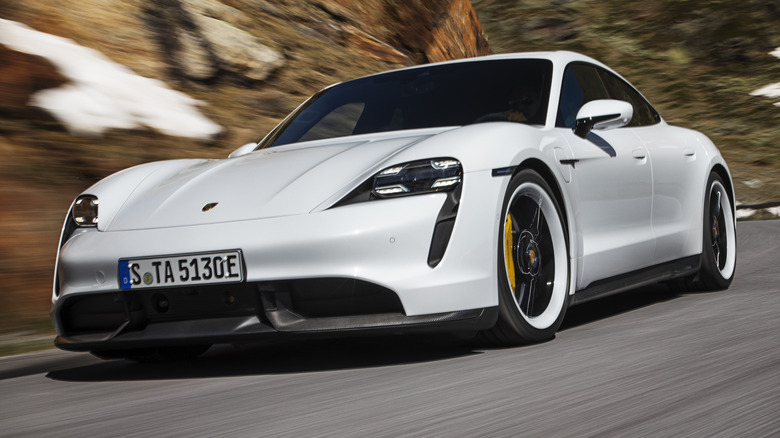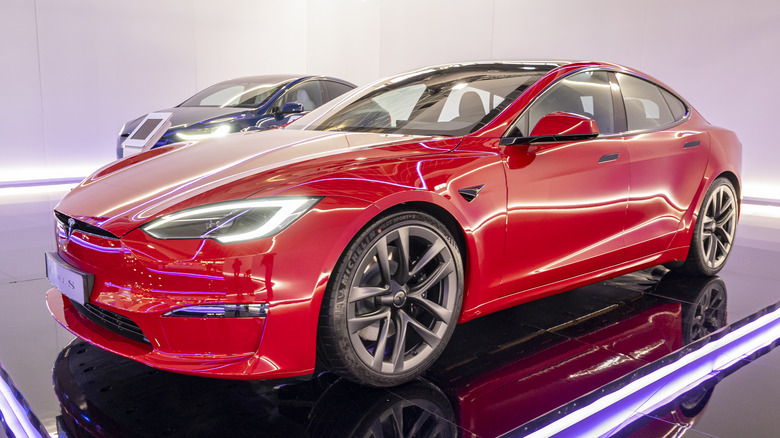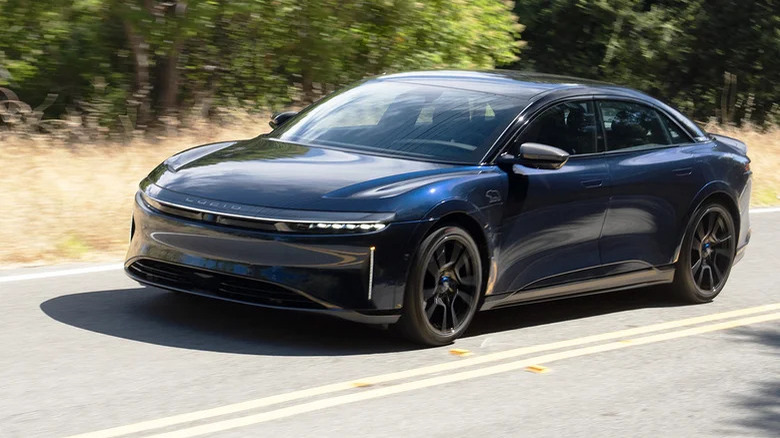12 Of The Fastest Sedans Ever Made, Ranked
It might no longer be the most popular body style on the market, but the sedan segment is still brimming with exciting models. The days of boring, unimaginative sedans are long gone, as in order to stand out today, every model needs to offer high levels of practicality, value, or performance. Often, it's a mix of all three.
For the cars that focus on performance, it's no longer enough to simply put a slightly more powerful engine in a wallowing chassis. The fastest examples today offer acceleration and handling on par with many sports cars, all while remaining practical enough to feasibly perform family hauler duties when they're not being driven on the ragged edge.
The recent wave of high-end electric sedans has redefined the benchmark for performance at the top end of the segment. As the technology progresses, it seems like they'll only continue to get more powerful. For now, though, here are 12 of the fastest ever made, ranked by their official 0-60 mph times.
12. Bentley Flying Spur Speed – 3.7 seconds
The Bentley Flying Spur Speed is first and foremost designed to be an ultra-luxurious limousine whisking its occupants to their destinations in complete comfort, but it has some hidden talents. As the top-spec version of the Flying Spur line, the Speed boasts some extra horses under the hood thanks to the twin-turbocharged W12 engine. Quite a lot of extra horses, in fact — 626 of them to be precise, along with 664 ft-lb of torque.
This enables the Flying Spur Speed to hit a top speed of 207 mph and make the sprint from 0-60 mph in just 3.7 seconds. However, it's unlikely that most Bentley drivers will be testing the performance limits of their car on a regular basis, so the Flying Spur Speed packs a suite of additional features to help its transition from wild to mild be as smooth as possible. Four driving modes are available to choose from, each affecting things like chassis stiffness and engine response, with Comfort mode designed to make the car just as relaxing to drive as any other luxury Bentley.
Adaptive Valve Control also ensures the car's soundtrack matches its driving manners. In comfort-oriented modes, the exhaust note is toned down to ensure a serene ride for drivers and passengers, but in Sport mode, the engine's full howl is unleashed. All of these extras come at a premium over the standard Flying Spur, pushing its asking price north of $260,000.
11. BMW Alpina B7 – 3.6 seconds
Drivers who prefer their luxury limousines to be German rather than British have plenty of options. However, those who also require their luxo-barge to reach supercar-level speeds are limited to just a handful of cars, and the BMW Alpina B7 is one of the very fastest. We reviewed the current generation B7 in 2020 and, unsurprisingly, found it a blast to drive, with its refined cabin belying its unflinchingly rapid power delivery. The B7 is officially claimed to reach 205 mph and reach 0-60 mph in 3.6 seconds — shockingly fast for a car with an unladen weight of 4,806 lb.
As well as being extremely quick, it's also extremely rare. Alpina says it sells around 1,200 to 1,700 cars across its whole range every year. For context, Mercedes-Maybach sold 21,600 cars in 2022. Unlike Maybach, Alpina's cars aren't always easy to distinguish from regular BMWs, at least not at first glance. Exterior branding is limited to a handful of Alpina logos dotted around the car, alongside the standard BMW badging. Alpina's famous 20-spoke wheels will give the game away to those in the know, but other than that, there's little to alert passersby to the presence of such a rare machine.
Of course, all its exclusivity comes at a price, although it's largely comparable to other luxury rivals — expect to pay somewhere north of $140,000, depending upon options.
10. Alfa Romeo Giulia GTA – 3.6 seconds
Ferrari doesn't make a sports sedan, but if it did, it might look a lot like the Alfa Romeo Giulia GTA. The GTA took the platform of the Giulia QV and cranked everything up a notch, with a limited run of 500 units announced in 2020. It features an upgraded version of the QV's 2.9L twin-turbo V6, producing 540 horsepower. That engine is closely related to Ferrari's F154 V8 engine, which can be found powering everything from the California T to the SF90 Stradale. The extra power squeezed out of the V6 allows the GTA to run from 0-60 mph in just 3.6 seconds.
The chassis — which was also developed with assistance from Ferrari engineers — is well equipped to handle the power boost. In addition, weight in the GTA is kept to a minimum through the liberal use of carbon fiber, which features everywhere from the sport seats to the hood and roof. The GTA also gets an exterior makeover to differentiate it from lesser Giulia variants, with a new Formula 1-inspired body kit designed in collaboration with Sauber Engineering.
Unfortunately for American buyers, Alfa never brought the GTA or its stripped-out sibling, the GTAm, to America. Instead, the majority of examples were sold to European buyers, with some also finding homes in Australia, Japan, and China.
9. Dodge Charger SRT Hellcat Redeye – 3.5 seconds
While the two-door Challenger SRT Demon 170 is the king of the dragstrip with its sub-2.0 second 0-60 mph time, the fastest Charger sedan isn't too far behind. In fact, at the time of its release, the Dodge Charger SRT Hellcat Redeye was billed as the fastest mass-produced sedan in the world. It no longer holds that title, and depending on how it's measured, perhaps never did, but its performance stats are extremely impressive nonetheless.
Its officially quoted 0-60 mph time is around 3.5 seconds and its top speed stands at 203 mph. Power came courtesy of an upgraded version of the 6.2L Hellcat V8 pumping out 797 horsepower and 707 lb-ft of torque. Among the upgrades was a new 2.7L supercharger, the largest sold on a production car at the time.
The engine's rpm limit was also increased to 6,500, up from 6,200 rpm in the standard Hellcat, and an improved fuel injection system helped keep the gas-guzzling V8 adequately fed. Perhaps the biggest appeal for many buyers, however, was the Hellcat Redeye's comparatively reasonable asking price. It retailed for around $85,000, making it the cheapest car on this list.
8. Mercedes-AMG EQS 53 4MATIC – 3.4 seconds
As the unrivaled benchmark in the luxury sedan segment, the Mercedes-Benz S-Class presented a problem for its automaker. Buyers demanded an electric version, but it had to be one that matched up to the gas-powered car in every key way. Not only did it have to match up to the car's levels of luxury and performance, but it also had to feel as cutting-edge as its gas-powered stablemate. The resulting car was the Mercedes-Benz EQS. Shortly after its unveiling, a 751 horsepower AMG-fettled version was also revealed, with the top-spec variant being the AMG EQS 53 4MATIC+.
We spent some time with the Mercedes-AMG EQS at launch in 2022 and found its spaceship-like interior with its huge MBUX Hyperscreen to be a unique, if not entirely faultless, experience. Mercedes clearly aimed to make the car feel as futuristic as possible in every aspect, although whether that's a good thing will be largely down to personal taste. As for the comparisons to the S-Class, we found those to be broadly justified, with the car offering unwavering levels of smoothness even during more spirited driving.
The opportunities to push the EQS AMG's performance limits on the road are near non-existent, at least for anyone who doesn't want to risk obliterating their license. Its 3.4 second 0-60 mph time is achievable as long as battery capacity is at 80% or higher, although its top speed is limited to 155 mph.
7. Cadillac CT5-V Blackwing – 3.4 seconds
The CT5-V Blackwing is a bittersweet proposition for fans of the brand. It's the latest in a line of track-oriented luxury sedans that deliver both unprecedented levels of acceleration and cornering ability. However, it's also the last gas-powered Blackwing that will ever be built, as Cadillac's high-performance division is setting its sights on electrification from now on.
It's a glorious swansong, with the car's 6.2L LT4 V8 engine delivering 668 horsepower and 659 lb-ft of torque. That engine can be paired to either a six-speed manual transmission or a ten-speed auto 'box, with the latter boasting the fastest official 0-60 mph time. At just 3.4 seconds, it pulls off the line faster than a Ferrari Enzo. Buyers opting for the manual can hope for a best time of 3.6 seconds, although of course, that will be down to the driver's skill level too.
Inside, the CT-5 Blackwing boasts some extra track-ready upgrades including the latest version of the Performance Data Recorder, which records video both on the track and on the road if needed. The sports seats enclose the driver and passengers to ensure they're held firmly in place during high-speed cornering, although they're just as comfortable as Cadillac owners will expect. The CT-5 Blackwing starts at $93,495 for 2024, although go wild with the options list and it's possible to push that price to around $120,000.
6. Audi RS E-Tron GT – 3.3 seconds
While it's a little slower off the mark than its platform sibling the Porsche Taycan, the Audi RS E-Tron GT is no slouch. Quite the opposite, in fact, as our reviewer of the 2022 Audi RS e-tron GT couldn't fault its power delivery and even found its off-the-line performance to be quicker than officially claimed. According to Audi, the RS E-Tron GT is capable of 0-60 mph in 3.3 seconds, but our reviewer clocked a best time of 3.09 seconds. When it's not burning rubber on a drag strip, the RS E-Tron GT is as comfortable to drive as any other Audi.
It also ticks the practical daily driver box too, with up to 14.3 cubic feet of trunk space available with the rear seats folded down, and additional room in the frunk. However, anyone looking to daily drive the Audi will need to keep an eye on their speed — like many electric cars, the RS E-Tron GT's abundant reserves of power and quiet cabin mean that it's easy to reach highly illegal speeds without even blinking.
Apart from that, there is one other limitation to the car's usefulness as a daily driver: range. With 232 miles of range available, and that figure decreasing for drivers with heavier feet, it's far from the best performer in class in that regard. The $147,100 starting price undercuts plenty of its rivals though, and other than some small compromises, there's very little we disliked.
5. BMW M5 CS – 3.0 seconds
The BMW M5 is already one of the fastest cars of its kind and can keep up with cars that cost double its MSRP while providing enough seating and cargo capacity for a small family. The M5 CS takes things even further with 635 horsepower and a weight reduction program that shaves more than 150 lbs off the next-hottest variant, the M5 Competition. Combined with its race-ready Pirelli P Zero Corsa tires, all of these modifications make the M5 CS capable of a 0-60 mph time of three seconds flat.
At the time, that made it the most powerful BMW M car ever made, although it's since ceded that crown to the outlandish (and very polarizing) XM Label Red hybrid SUV. Nonetheless, it's still BMW's fastest sedan, yet it keeps its family-friendly trunk space and still features seating for four.
These improvements all come at a steep cost, however. The model launched stateside in 2022 at a starting price of more than $140,000. That's a lot for anyone to spend on what's still, at the end of the day, a 5 Series, but then again, it's not like anyone's going to mistake one of these for a 530i.
4. Brabus Rocket 900 – 2.8 seconds
Brabus is a German tuner with a long history of modifying Mercedes-Benz cars, but the limited-run Rocket 900 is one of its maddest creations to date. It uses the Mercedes-AMG GT 63 S 4MATIC+ as a starting point, taking its 4.0L V8 engine and increasing its displacement to 4.5L. Two Brabus-developed turbochargers are then fitted, giving the car a total output of 900 horsepower and 774 lb-ft of torque. Brabus says the engine can produce up to 922 lb-ft of torque, but to preserve the rest of the car's internals, it's been limited here.
Mercedes' 4MATIC+ all-wheel drive system combined with sticky Pirelli P Zero tires ensures that all that power is transferred to the ground with maximum efficiency, while larger air intakes help keep the brakes cooler for longer under repeated heavy use. This all translates to some eye-watering performance stats. The Rocket 900 can accelerate to 60 mph in just 2.8 seconds, while zero to 186 mph takes 23.9 seconds. The car will keep accelerating all the way to an electronically limited top speed of 205 mph — Brabus notes that the car could go faster, but the tires aren't rated for faster speeds.
As with all its cars, pricing isn't disclosed for the Rocket 900. However, buyers can expect to add several hundred thousand dollars to the $170,000 asking price of the standard GT 63 S for the chance to own one.
3. Porsche Taycan Turbo S – 2.4 seconds
The most potent variant of Porsche's flagship EV is the Taycan Turbo S, which boasts 750 horsepower and a zero to 60 mph time of 2.4 seconds. We tested the car at launch and found it to be one of the best handling EVs on the market, feeling better to drive than a Tesla Model S despite the latter car having the edge on straight-line performance.
The Taycan was designed to be a four-door electric counterpart to the 911 — perhaps the closest comparison is an electric Panamera — although the new powertrain means that it's not an exact match. Part of that is down to the Taycan's weight, as batteries make the car a lot heavier than its gas-powered stablemates, although we thought Porsche did a fine job of adjusting its chassis to compensate for the extra weight.
Then there's the noise — or rather, the lack of it. There's no howling soundtrack accompanying a stab of the throttle, although that does have the effect of making the cabin feel relaxing even at higher speeds. The cabin, incidentally, is also notably different from other cars in the Porsche lineup, with more than a hint of Tesla-esque minimalism. Although the top-spec Taycan might be able to hold its own against other super-EVs off the line, its top speed is a little lower than most, clocking in at 162 mph. It's also far from the cheapest EV of its kind, with prices reaching close to $200,000.
2. Tesla Model S Plaid - 1.99 seconds
Tesla's fastest vehicle remains the benchmark for mass-produced performance EVs, even if it no longer holds the crown of being the fastest in its segment. Any Tesla fan (and indeed most EV enthusiasts) will likely know the numbers by now: 1,020 horsepower, a 200 mph top speed, and a 0-60 time of 1.99 seconds. Of course, the Model S Plaid also comes with plenty of other benefits over rival tire-shredding EVs. Arguably the biggest is access to Tesla's industry-leading Supercharger network, which provides convenient and speedy recharging for when the car's 396 mile range gets low.
It's worth noting that some owners, including tech YouTuber Marques Brownlee, have claimed that the official range figure is a bit over-optimistic, with low-to-mid 300-mile figures being more realistic. While its real-world range is debated, no one is arguing with the mind-boggling amount of power on offer, especially considering the Plaid's current price. Tesla's recent price cuts have seen the top-spec Model S reduced to just under $90,000, making it one of the cheapest cars here as well as one of the very fastest.
1. Lucid Air Sapphire – 1.89 seconds
With an officially quoted 0-60 mph time of 1.89 seconds, the Lucid Air Sapphire is the fastest sedan on the market, and one of the fastest accelerating cars out there, period. It takes just 3.84 seconds to reach 100 mph from a standstill and boasts a top speed of 205 mph. That's practically unheard of for a car that's still roomy enough to transport a family and their luggage. Unlike some other performance EVs, the Lucid Air Sapphire doesn't compromise on its range either — the EPA estimates the car will achieve 427 miles of range in between charges.
We drove Lucid's top-spec car early in 2023 and can confirm that its almost unbelievable performance stats translate to an on-road experience that's also a little unreal. It's frighteningly easy to hit license-losing speeds, and even on a wide-open race track, the driver's nerve is likely to be the limiting factor rather than the Lucid's capabilities. It's a technical showcase for the automaker's engineers to show what's possible at the cutting edge of EV performance, albeit one that's actually available for mere mortals to buy. It will require deep pockets, however: at a starting price of roughly $250,000, it's more than two and a half times the price of the Tesla Plaid.
